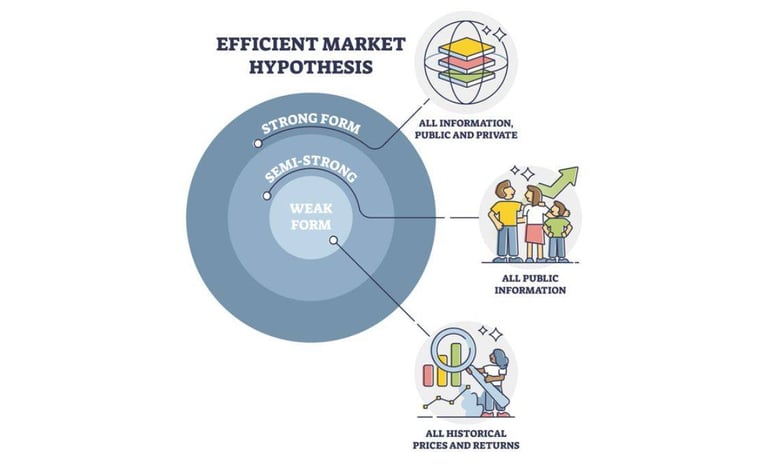Market efficiency hypothesis
Efficient market hypothesis or EHM is an investment theory which suggests that prices of financial instruments reflect all available market information.
5/8/20242 min read
Market Efficiency Hypothesis
Market efficiency is the degree to which market prices reflect all available and relevant information. That means that if a market is efficient, then all the information is already incorporated into the price and there exists no possibility to beat the market.
As the quality and the amount of information increases the market becomes more and more efficient in decreasing opportunities for arbitrage and above market returns.
The hypothesis also states that the stocks always trade at their fair value on exchange, making it impossible to purchase undervalued stocks or sell them at inflated prices. Thus, making it impossible to outperform the market through expert selection or market timing.
Thus an investor can obtain higher returns only by purchasing riskier investments.
The three forms of efficient market
Weak form :- Here, price reflects all the historical information. So, past price movements cannot be used for predicting future prices. Therefore, any technical analysis based result should not be expected to help in achieving persistently higher market returns.
Semi- strong form :- Prices reflect all the publicly available information (reports, news etc). Thus, neither technical analysis nor fundamental analysis would be reliable strategies to gain higher returns.
Strong form :- Prices reflect all information, both public and private (insider information ). So, no investor, including an insider would be able to gain above market returns.
Arguments for efficient market hypothesis
Efficient market quickly absorb new information, making it difficult for investors to outperform through stock pricing or timing. This is due to the collective actions of many participants incorporating new information into prices.
Market efficiency ensures fair valuation, fostering investor confidence and efficient capital allocation, which promotes economic growth and stability. Trust in pricing mechanism reduces the risk of speculative bubbles/prolonged mis-pricing.
Passive investing , reflecting EMH principles, involving holding a diversified portfolio mirroring market performance. By accepting market returns and avoiding attempts to beat the market, passive investors benefit from lower costs and fees, aligning with the belief in market efficiency.
Argument against efficient market hypothesis
Behavioural biases and irrational behaviour among investors lead to systematic mis-pricing and market inefficiencies, as they may overreact to news or engage in herding behaviour.
Market anomalies like momentum and value effect, contradicts EMH assumptions suggesting that certain trading strategies can consistently outperform the market.
Inefficient information processing, such as information asymmetry and limited data access allows informed traders to gain an advantage. Undermining the idea of perfect information dissemination in efficient markets.


